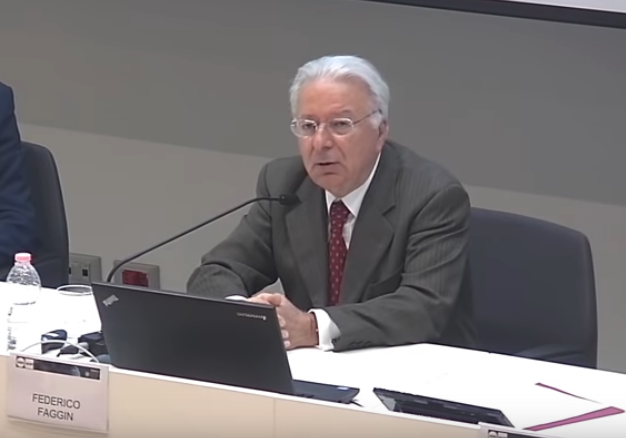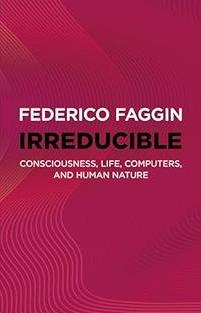|
home | what's new | other sites | contact | about |
|||
|
Word Gems exploring self-realization, sacred personhood, and full humanity
Soulmate, Myself:
return to the 'touching foreheads' main-page
Kairissi. Our discussion here crosses the line into technical aspects of physics, and so we must ask forgiveness of our readers concerning the extra effort required to understand. Elenchus. We believe that the benefits to be gained, however, will outweigh the discomfort of sorting out new concepts. K. Federico Faggin is the genius-inventor of the world’s first silicon chip in 1971. He also invented the touch pad, the touch screen, and neural networks. Arguably, he’s the best tech-mind anywhere, maybe the smartest man alive. E. Today, he’s probably the leading spokesperson in the world concerning the primacy of consciousness, not matter, as fundamental in the universe. Dr. Federico Faggin: consciousness and quantum fields
Editor's note: All quotations provided herein are from Irreducible, pgs. 163 f.
K. Our readers are well advised that there is so much ground-breaking information in his new books – they are some of the most important research findings of the last hundred years, worthy of our close study. Editor's note: see many short articles, near the bottom of the "quantum" page, summarizing key concepts in his writings. E. We cannot address everything in his books, but we would like to focus on one narrow aspect that helps us better understand the mysteries of romantic love; specifically, the desire of two lovers to touch foreheads and what this means.
K. We see these two lovers here. Obviously, there’s some traumatic issue in play. And it’s as if they’re trying to enter the privacy of the other’s mind, so as to gain greater intimacy and shared experience. E. Dr. Faggin has learned a great deal about the privacy of experience. There is a term “qualia.” It refers to “what is it like?” For example, let’s say you saw a movie, and you’re trying to tell a friend about it, “what it was really like.” K. We can speak words about the experience, we can offer symbols, but these can never convey full meaning. This is Newtonian or “classical information.” It’s information from “the outside”, at the periphery of the experience. We cannot communicate directly our sense of elation, or fear, or inspiration, or disgust – what we really felt about the movie. The listener can’t get inside our head to experience what we actually saw and felt. E. That kind of information is private, available to ourselves alone, is from “the inside.” K. Faggin has put forward the distinction that classical physics deals with exterior elements of spacetime (3+1 dimensions), but quantum physics needs to be seen as addressing an interiority, the hidden world of private meaning. E. It's information from "the inside." Faggin says that our minds are “pure quantum states,” which are “private” and “only knowable from ‘the inside’ by the system that is in that state.” K. This is important because Faggin and fellow scientists realized that these quantum states have the same characteristics as that of consciousness at large. E. And this was one of the main indicators, early on, that consciousness is a quantum system. tasting chocolate and a digital photo of chocolate, or an e-file of information on chocolate, are not the same thing K. Faggin had tried to create a computer with human-like intelligence but, after some years, realized that this was not possible. Computers can deal with mechanical, math-based, or technical information, but they cannot work with qualia. For example, a computer can record data about how the molecules of chocolate interact with taste-buds and send electrical signals to the brain, but a computer can never comprehend what chocolate actually tastes like.
E. The qualia of the taste of chocolate is a private experience, from “the inside,” requiring consciousness. It cannot be reduced to a computer algorithm, or classical bits of information. This means that you cannot make a copy of this file of information, like a Word document or digital photo, and store it in memory. This cannot be done because “consciousness is not a computation,” as some have said. “It is important to realize that saying that a conscious experience can be represented by a pure [quantum] state does not describe the experience itself. If it did, a pure state would be reproducible. Non-clonability expresses the existence of something private, inviolate, that can only be known by the system itself and by no one else. In other words, though I can represent the love I feel for my son with a pure quantum state – a quantum symbol – the meaning of that symbol can only be known by me, for the mathematical symbol cannot describe what I feel.” K. A quantum state is “non-clonable,” Faggin says, you can’t make it go viral and send it everywhere. It’s a totally private experience on “the inside.” Even more, a quantum state, which undergirds consciousness, possesses infinite layers of meaning. One’s consciousness of an experience is so multi-faceted that even we ourselves cannot know our own depths – let alone share this with others. “If a computer repeats like a tape-recorder the same words I use to describe the love I feel, it would have my same outer behavior, but without any inner experience... Herein lies the fundamental difference between a classical computer and a conscious quantum entity.” E. I’ll tell you what this reminds of. How often I've said to you, when I see something from a higher vantage point, “I can’t put it into words, it feels like a traffic-jam in my head.” K. Yes, not only can you not explain it to me, but, though you can feel the meaning, you can’t use words to explain it to yourself. E. It's very strange, isn't it. Words are symbols, and no symbol can convey full meaning, even if they're my words trying to explain, to myself, my own experience. K. But you can wordlessly feel the meaning. And that's what consciousness is, a wordless higher intelligence beyond or behind the thinking mind. Why do lovers naturally desire to touch foreheads? K. The answer here cannot be offered in a scientific way. E. We can’t measure this and put a ruler up against it. K. But this doesn’t mean that we’re totally ignorant of what’s happening. The entire inner world of quantum mechanics is something that can’t be quantified. E. Kriss, what can we say about this? K. Here’s something that comes to mind. It’s just an indication and partial answer but worthy of our meditation. I’m thinking of what we said in “The Wedding Song.” It was shocking to discern that a hidden meaning of Genesis 2:24 was that Twin lovers will be offered a kind of private universe, a private paradise in which to experience their love. E. It is amazing. But this doesn’t mean that there are “multiverses,” but that, in a sense, the universe was created just for them, to make of it what they wish. K. The universe is for each Twin couple because they each enjoy the undivided focus and attention of God’s love. E. And what about our grieving two here, so eager to touch foreheads? What does this really mean? What do you think, Kriss?
K. I think part of the answer is safe to assume. They know what all humans know, that thoughts are private and inviolate. E. But this doesn’t stop them from attempting to enter that off-limits “holy of holies” of the other’s mind. K. Think of this, too. We don’t go around attempting to touch foreheads with others. Of course not, it’s way too intimate. E. The very idea is off-putting. But lovers naturally try to do this because it’s part of their cosmic desire to become One. K. But even though they know what all humans know, that thoughts are private and inviolate, they nevertheless symbolize, by touching foreheads, a mind-meld, an entering of the other’s domain of aloneness - the quantum state of solitude. They want to picture this, I think, because, on some level, they sense that eventually they’ll be able to do this for real… to become a synthesis of minds, a “union of spirits.” E. We’re reminded, too, of the reports from the other side concerning lovers actually achieving this mind-meld. They use the phrase, we “became” each other.
E. There’s something related; not exactly relevant, but related. K. What are you seeing? E. In the “I need some space” article, I spoke of this photo of Jamie:
E. She’s a pretty a girl, and, from a certain perspective, she reminds me of you. And yet, despite the similarity, I said I felt a “distance” and “emptiness” when I looked at this girl. K. (silence) E. There is no intrinsic meaning attached to a photo or a face. We, on "the inside,” supply our own meaning, in the private solitude of a quantum state of being. K. (softly) Would you want to touch foreheads with her? E. Absolutely not; nothing wrong with Jamie, but it doesn't feel right. K. How does this relate to John and Mary? E. John might be more than willing to enter physical relations with this pretty Mary - but touching foreheads, symbolizing sharing the deepest secrets of the soul, is not necessarily part of the bargaining process, as far as John is concerned. K. I recall you saying, and it's making more sense now, that John isn't so interested in talking with Mary. E. I think the key here is sharing meaning. Meaning and semantics are part of the deep quantum inside, and no one wants to do that unless they feel that the other has a right to enter that door. K. That would be your Twin. E. That one person with whom you're meant to stand before God. K. But dealings with "the outside," the games people play on Saturday night, is the easy part, and there's usually no great meaning coming with it. E. Faggin says that our consciousness is not localized in the physical body but in the underlying quantum fields. The "fields" are where our consciousness "resides," not the body. This would indicate that meaning and semantics are part of the quantum fields, which means, they're part of consciousness, and consciousness is the great attribute of the One -- Faggin's term -- which is the subsuming intelligence of the universe. K. To say that meaning and semantics are part of the "fields" is another way of saying that these reflect the mind of God. E. And because we know we're connected to God, to universal consciousness, on the deep inside, then we can know that, in this connection, we derive meaning and purpose from the mind of God. K. And this is also a big part of what enlightened Twins really want when they mind-meld. E. We've called it joint-meditation, a joint accessing of the mind and life of God.
E. It becomes increasingly clear that there are two forms of erotic love: one rooted in the body, a union of bodies, and the other a melding of minds, a union of spirits. K. And we’ve discovered, contrary to what many imagine, that the latter is the more potent. E. One way to describe this is, physical love-making is associated, of course, with thrill and excitement, elevated heart palpitation, rising temperature – overall, it’s a state of agitation. K. A great disquietude, but a pleasurable sort. E. However, the other kind of eroticism is different. It’s characterized by a sense of “coming home,” of “complete rest to the soul,” of “soulmate, myself,” and “I have become you.” K. We have said that this other kind of erotic experience is far more pleasurable. Not many will believe this right now, but it’s true because the “melding of spirits” begins to access a oneness which takes us to the foothills of ultimate reality. E. Oneness, union, and harmony characterize the energies of Mother-Father God. K. And this is why it feels so good to enter this state. And it’s why lovers naturally want to touch foreheads. E. I was thinking of all this as I pictured us beginning our new lives in Summerland. K. What did you see? E. I saw myself wanting you. I knew that physical love was still very important, but I also saw that, many times, what I really wanted was to just lie down with you and touch foreheads. I saw us preparing for our wedding, all the preparations, and I saw the other activities, our busy schedule with so many things that we want to do. And as I saw all this I noticed within myself a tendency to inwardly drift into a lack of focus. K. (softly) Distracted with too many “glittering baubles” of the external world. E. And when this happened, and I could be tempted toward this every day, I found myself deeply desiring to simply lie down with you, to touch foreheads, as this would re-center my deeper person. K. A healing balm from the materialism of life’s duties and projects. E. I could see this very clearly, and how much I craved recapturing that “complete rest to the soul,” which I readily find when I’m near you in that focused way. K. Elenchus, there’s something Krishnamurti said that might help us explain. He talked about two kinds of “space.” The first kind is created by the ego with “observer and observed.” E. Or, lover and beloved. And the ego will create “distance” between them in this psychological space. K. But there’s another kind of “space” which, he said, gives us a perception of freedom. In this space, there is “no you and no me,” all boundaries collapse, and one enters a timeless, infinite world. And this is the mystical world of touching foreheads. E. We’re reminded of Peter Russell’s lecture on “the world from the photon’s point of view.” All distance shrinks to zero, and time itself goes away. K. The photon’s point of view seems to have much in common with the world of touching foreheads. I suspect that we’re tapping into our true underlying energies, composed of light (as discussed in the Gospel Of Thomas). E. Kriss, these things are so wonderful, and so mysterious, that I know we’ll be pondering them for a very long time, even in the next world. And right now my mind is flooding with so many images of our coming time of life-and-love in the homeworld… I hadn’t really seen this before. K. Please share. E. It’s a simple thing, but… at least to me… deeply moving. K. (silence) E. In Summerland, we picture ourselves living on a farm or a country setting. There’s a large pasture just outside our front door. Our many animals like to enjoy themselves there during the day, and we like seeing them, peaceful and contented, in this pasture. K. (smiling) E. And I picture myself stepping outside the front door of our house, and I like it so much because, immediately, the pasture is right there. And recently I asked myself, why do I feel so good having that pasture right outside my front door? And it suddenly came to me, what this really means. That pasture, with its wide open spaces, is a symbol, to me, of the kind of space that represents psychological and spiritual freedom. unbounded, untrammeled, unfettered K. It helps you enter that mystical world of “complete rest to the soul.” Elenchus, it’s interesting that the author, on the WG homepage, speaks of the prairie of his youth in these same terms. E. He said that he’d “become the prairie.” When eyes finally opened, however, I left behind the inculcated illusions of limitation imposed by Dear Leaders and, in spirit and heart, became the prairie. Its magical panorama of endless horizon -- unbounded, untrammeled, unfettered -- symbolizes, for me, a sacred autonomy, an invitation to full humanity, an infinite human capacity, a measureless inner cosmos -- vast, wide open, without discernible limit -- the wondrous destiny of every creature "made in the image."
E. I believe that… one’s sacred beloved becomes the shortest route of access to this unbounded, untrammeled, unfettered inner world of oneness, psychological freedom, and “complete rest to the soul.” K. That shortest route is “touching foreheads.” Each for the other, lovers offer an expedited ticket to the domain of endless horizon and secret garden.
|
|||
| ` |






